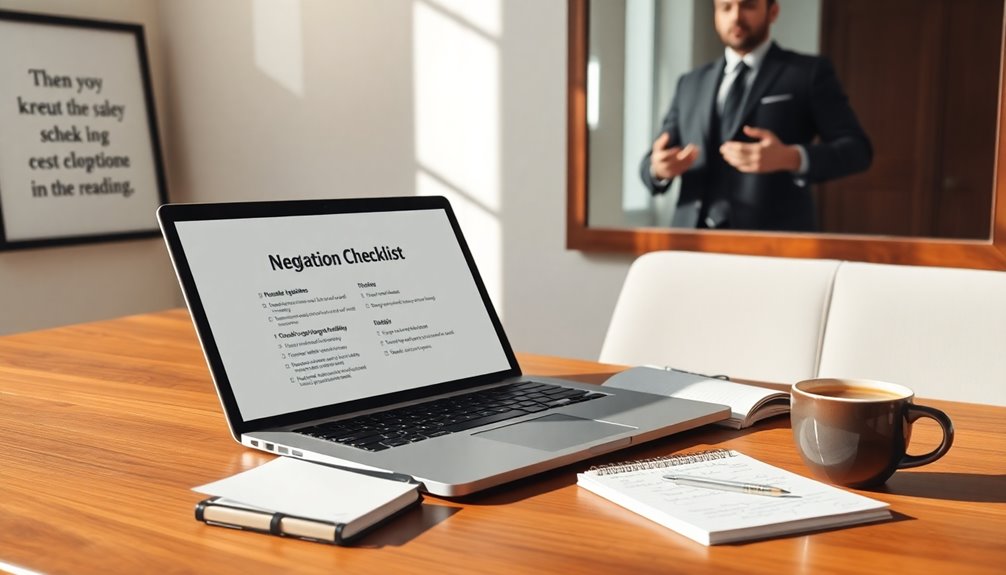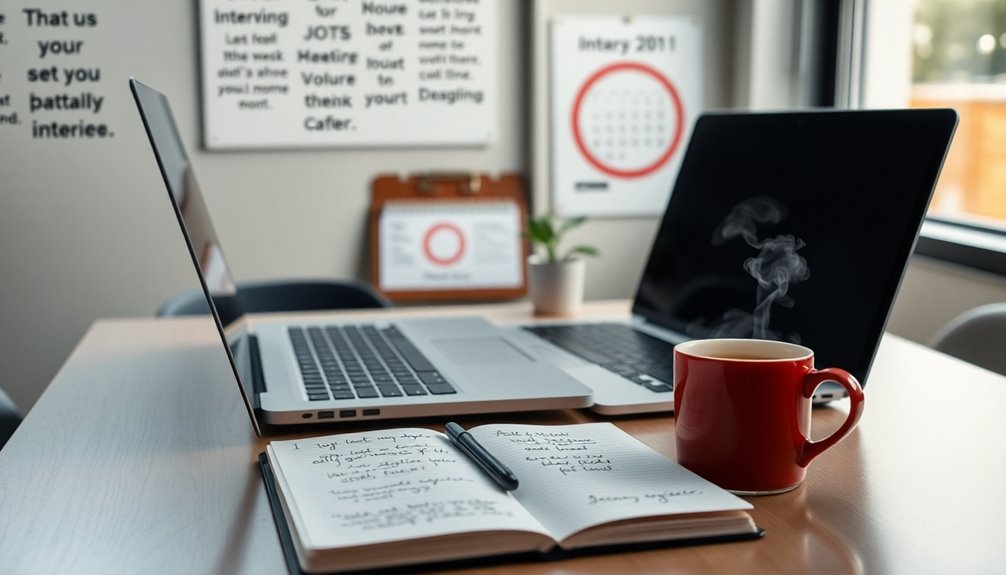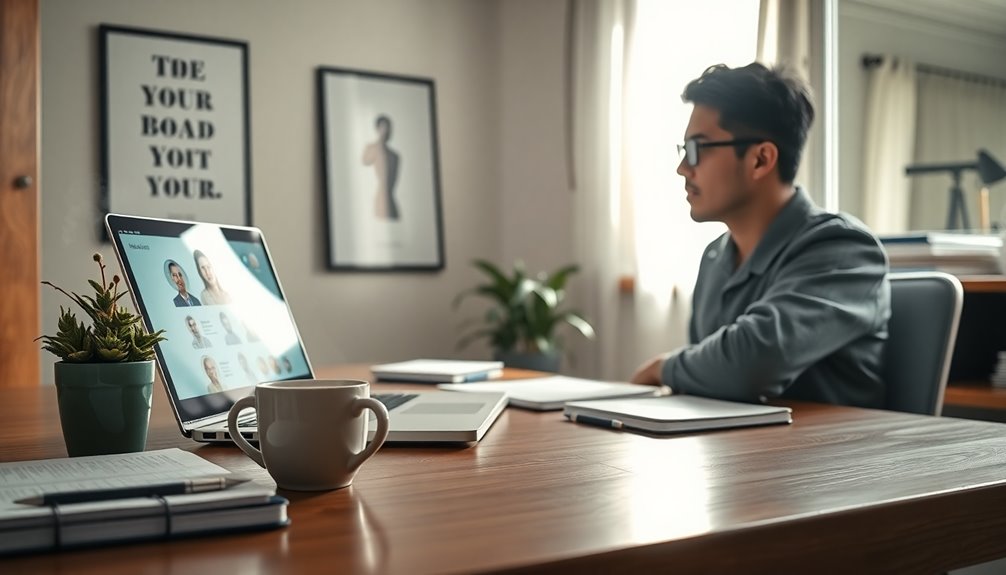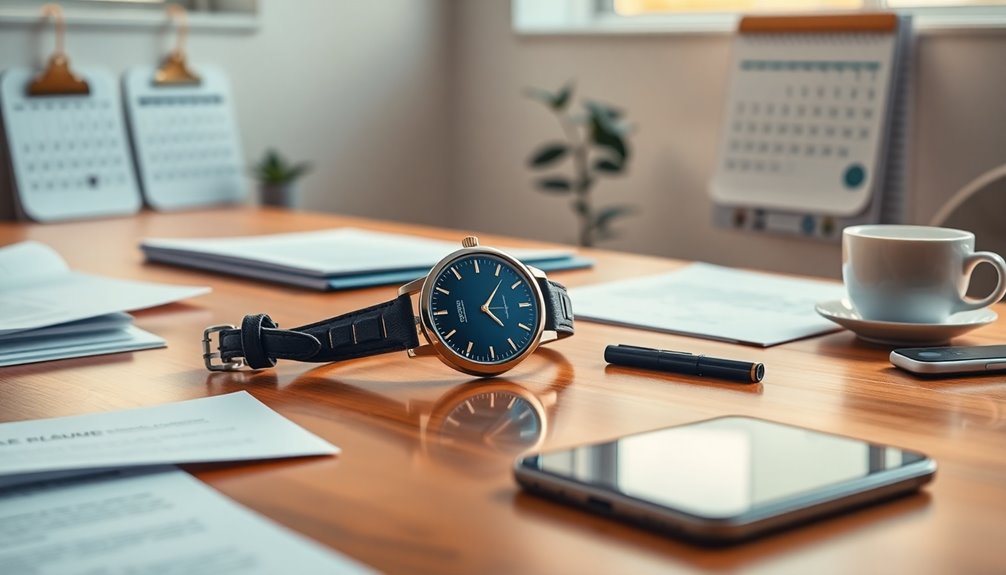To master your promotion interview preparation, start by clarifying your career goals and understanding the expectations of the role you desire. Research your performance against department metrics and industry salary standards. Build a strong case by showcasing your contributions and unique skills that align with the company's goals. Timing matters, so choose strategic moments to request a discussion about growth. Don't forget to prepare for common interview questions and practice your answers. If you want to truly stand out, there's much more to explore that can help you ace that promotion interview.
Key Takeaways
- Define your career goals and clarify your interest in management or individual contributor roles before the interview.
- Gather data on industry salary standards and your department's performance metrics to support your case.
- Schedule a dedicated meeting focused on growth and prepare to articulate your contributions and readiness for the new role.
- Highlight unique contributions and successful projects that align with the company's goals to differentiate yourself from other candidates.
- Be ready to negotiate your salary by knowing your worth and discussing additional benefits that may enhance your overall compensation.
Understanding Promotion Interviews

Understanding promotion interviews can be crucial for your career advancement. These interviews differ from standard job interviews, focusing on your growth within the same company.
It's important to identify what you want from the promotion—whether it's recognition, a salary increase, or new responsibilities. Clarifying your goals helps you articulate your reasons for seeking a promotion effectively.
Consider your interests as well; do you want to manage others or remain an individual contributor?
Prepare by understanding the expectations of the new role, as success can lead to raises and increased responsibilities. Additionally, engaging in trust-building activities can enhance your relationships with colleagues, making a positive impression during your interview.
Researching Your Case

Before you step into a promotion interview, it's essential to gather solid evidence that supports your case. This research will help you present yourself as the best candidate for the role.
Focus on these key areas:
- Review average salaries for the desired role across your industry and region.
- Assess your current performance against department metrics to highlight your achievements.
- Compile specific data and examples that showcase your readiness for increased responsibilities.
- Create a portfolio that illustrates your solutions and results, making your case more compelling. Additionally, understanding IRA investment strategies can provide insights into how strategic planning can enhance your professional growth.
Timing Your Request

Timing can be essential when requesting a promotion, as the right moment can greatly influence your chances of success.
Look for strategic opportunities, such as after the company achieves significant milestones or during positive performance reviews. Avoid approaching your supervisor during budget cuts or challenging times, as this can diminish your chances.
Schedule a dedicated meeting titled "Growth Discussion" to emphasize the importance of your request. Be prepared to discuss your contributions and readiness for the new role.
If your initial request is declined, ask for actionable steps or SMART goals to work towards in the future.
Standing Out as a Candidate

To stand out as a candidate for a promotion, focus on clearly articulating your unique contributions and aligning them with the company's goals.
Highlight how your skills and experiences make you the ideal fit for the role.
Consider emphasizing the following points:
- Your successful projects that directly impacted company growth.
- Specific skills that set you apart from other candidates.
- How your vision aligns with the company's future objectives.
- Testimonials or positive feedback from colleagues and supervisors.
- Incorporating audience engagement strategies can enhance your ability to connect with decision-makers during the interview.
Salary Negotiation Tactics

Negotiating your salary during a promotion discussion can be a pivotal moment in your career. To guarantee you approach this effectively, prepare by researching industry standards and knowing your worth. Consider asking for a 10% to 20% increase based on your contributions and market data. Be ready to discuss not just salary but other benefits, like bonuses or flexible hours. Here's a quick reference table to help you strategize your negotiation:
| Factor | Considerations |
|---|---|
| Current Salary | Know your baseline |
| Industry Standards | Research average salaries for similar roles |
| Percentage Increase | Aim for 10% to 20% increase |
| Additional Benefits | Be open to negotiating perks beyond salary |
| Company Constraints | Understand your employer's budget limitations |
Additionally, leveraging data-driven decision-making can significantly strengthen your case during negotiations.
Anticipating Interview Questions

Anticipation plays an essential role in preparing for promotion interviews, particularly when it comes to potential questions.
You'll want to predict what your manager might ask to show your readiness for the new role. Here are some common areas to focus on:
- Your motivations for seeking the promotion.
- Specific experiences or qualifications that set you apart.
- How you plan to address challenges in the new role.
- Your goals for the first 30 days if promoted.
Importance of Practice

Practice is essential when preparing for a promotion interview, as it helps you articulate your thoughts and responses with confidence. Engaging in mock interviews and seeking feedback from peers can greatly enhance your performance. You'll fine-tune your answers, reduce anxiety, and present yourself more effectively. Here's a quick overview of the benefits of practice:
| Benefit | Description | Outcome |
|---|---|---|
| Builds Confidence | Familiarity with questions reduces anxiety | Improved response quality |
| Identifies Weaknesses | Feedback highlights areas for improvement | Enhanced performance |
| Clarifies Thoughts | Practice helps organize your ideas | Clearer communication |
Additionally, incorporating strong communication skills into your practice can significantly improve your clarity and rapport during the interview.
Following Up Effectively

Following up effectively after a promotion interview is essential for demonstrating your continued interest and commitment to the new role.
A well-crafted follow-up can reinforce your qualifications and keep you top of mind. Here's how to do it:
- Send a thank-you email within 24 hours, expressing gratitude for the opportunity.
- Recap key points discussed during the interview to remind them of your strengths.
- Ask if there's any further information they need from you to assist in their decision-making.
- Politely inquire about the timeline for the promotion decision.
Additionally, consider incorporating advanced technology used in online reputation management to further enhance your communication and follow-up strategies.
Frequently Asked Questions
How Should I Dress for a Promotion Interview?
For a promotion interview, you should dress professionally to convey your commitment and readiness for the new role.
Opt for business attire that aligns with your company culture—think tailored suits or dresses. Choose neutral colors and avoid overly casual wear. Make sure your clothes are clean and pressed.
Pay attention to grooming and accessories as well; they should enhance your overall appearance without being distracting. Your goal is to project confidence and professionalism.
What Body Language Should I Use During the Interview?
During your promotion interview, use confident body language to convey your readiness. Sit up straight, maintain eye contact, and smile genuinely.
Avoid crossing your arms, as it can appear defensive. Instead, use open gestures to express enthusiasm. Nod occasionally to show you're engaged and listening.
A firm handshake can create a positive first impression. Finally, be aware of your facial expressions; they should reflect your interest and passion for the new role.
Can I Bring Notes or a Presentation to the Interview?
Yes, you can bring notes or a presentation to the interview. They can help you stay organized and guarantee you cover all your key points.
Just make sure your notes are concise to avoid reading verbatim. Instead, use them as prompts to guide your conversation.
A well-prepared presentation can also impress your interviewer, demonstrating your commitment and readiness for the new role.
Just be sure to engage in dialogue and not rely solely on your materials.
Should I Follow up After the Interview?
Yes, you should definitely follow up after the interview. It shows your interest and professionalism.
Send a thank-you email within 24 hours, expressing gratitude for the opportunity and reiterating your enthusiasm for the role. This gives you a chance to reinforce your key points and address any lingering questions.
If you don't hear back in a week or two, a polite follow-up can keep you on their radar and demonstrate your commitment.
How Long Should I Wait for a Response After the Interview?
You should typically wait about one to two weeks for a response after the interview.
If the employer mentioned a specific timeline, stick to that.
If you don't hear back, it's okay to follow up politely after a week, expressing your continued interest.
Remember, patience is key, but don't hesitate to check in.
This shows your enthusiasm and keeps you on their radar without coming across as pushy.
Conclusion
As you gear up for your promotion interview, remember that preparation is your secret weapon—think of it like having a ace up your sleeve. By understanding the dynamics, timing your request, and showcasing your strengths, you set yourself apart from the crowd. Practice makes perfect, so don't skip it! After the interview, follow up to reinforce your enthusiasm. With these strategies in play, you're not just ready; you're poised to seize that promotion and elevate your career.









